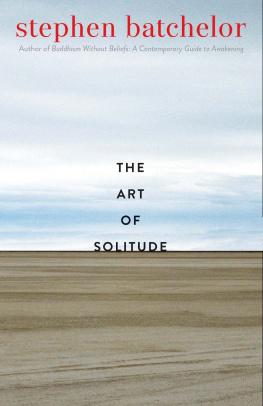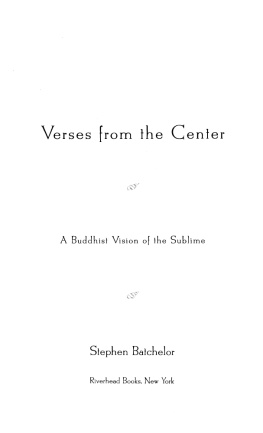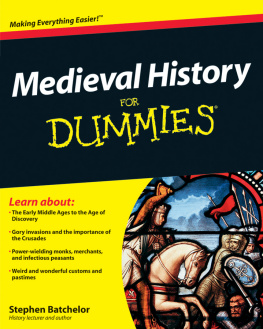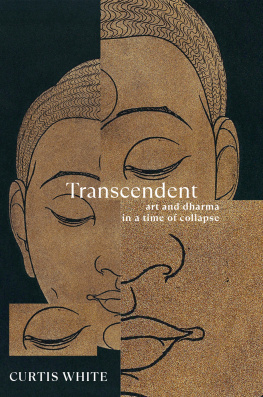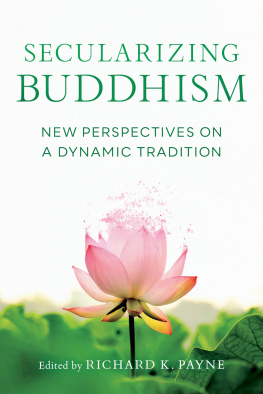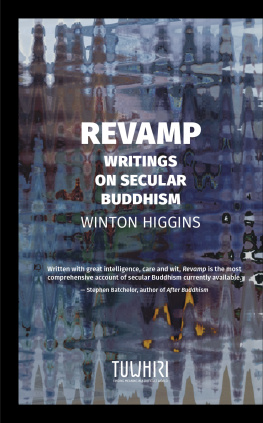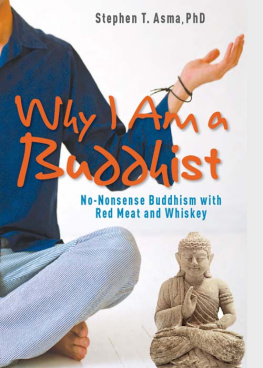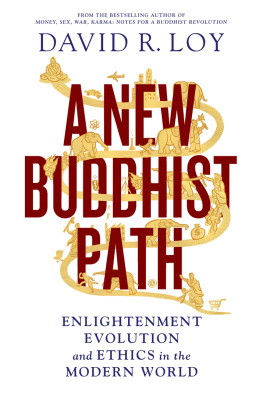SECULAR BUDDHISM
ALSO BY STEPHEN BATCHELOR
Alone with Others: An Existential Approach to Buddhism (1983)
The Tibet Guide: Central and Western Tibet (1988)
The Faith to Doubt: Glimpses of Buddhist Uncertainty (1990)
The Awakening of the West: Encounters between Buddhism and Western Culture (1994)
Buddhism without Beliefs: A Contemporary Guide to Awakening (1997)
Verses from the Center: A Buddhist Vision of the Sublime (2000)
Living with the Devil: A Meditation on Good and Evil (2004)
Confession of a Buddhist Atheist (2010)
After Buddhism: Rethinking the Dharma for a Secular Age (2015)
SECULAR BUDDHISM

IMAGINING THE DHARMA IN AN UNCERTAIN WORLD
Stephen Batchelor

Published with assistance from the Louis Stern Memorial Fund.
Copyright 2017 by Stephen Batchelor.
All rights reserved. This book may not be reproduced, in whole or in part, including illustrations, in any form (beyond that copying permitted by Sections 107 and 108 of the U.S. Copyright Law and except by reviewers for the public press), without written permission from the publishers.
Yale University Press books may be purchased in quantity for educational, business, or promotional use. For information, please e-mail sales.press@yale.edu (U.S. office) or sales@yaleup.co.uk (U.K. office).
Designed by Mary Valencia.
Set in Scala type by Integrated Publishing Solutions.
Printed in the United States of America.
Library of Congress Control Number: 2016948566
ISBN 978-0-300-22323-1 (hardcover : alk. paper)
A catalogue record for this book is available from the British Library.
This paper meets the requirements of ANSI/NISO
Z39.48-1992 (Permanence of Paper).
10 9 8 7 6 5 4 3 2 1
For Helen Tworkov
It should be borne in mind that there is nothing more difficult to arrange, more doubtful of success, and more dangerous to carry through than initiating change.
The innovator makes enemies of all those who prospered under the old order, and only lukewarm support is forthcoming from those who would prosper under the new.
NICCOL MACHIAVELLI, The Prince
PREFACE
As the practice of mindfulness finds its way into mainstream Western culture, more and more people today find themselves engaging in a form of Buddhist meditation. Such men and women may have little or no interest in Buddhism as a religion; their adoption of meditation occurs entirely within secular contexts such as healthcare, education, or the workplace.
The very fact that a core practice of an ancient world religion can be shown through clinical trials to be effective irrespective of whether one is a Buddhist raises fundamental questions about the nature of Buddhism itself. Is this tradition best characterized as a religion? Or did it start out as a practical philosophy and mutate into a religion? Might we still be able to recover from the teachings of the Buddha a vision of human flourishing that is secular rather than religious in orientation yet without compromising the integrity of the dharma?
Such questions have given rise to a phenomenon that is now being called secular Buddhism. This book traces how my own understanding and practice of the dharma has evolved in an increasingly secular direction over the past twenty-five years. The writings collected here date to the early 1990s, when I started writing for Tricycle: The Buddhist Review. I regard the work that began in this period as what eventually resulted in my coming to advocate a fully fledged secular practice of Buddhism. A key moment in this process was the publication of Buddhism without Beliefs, which was commissioned by Tricycle, in 1997.
The introductory essay (In Search of a Voice) and the concluding essay (An Aesthetics of Emptiness) were written for this volume. One other piece (A Much Younger Man, but No Less Charming) is published here for the first time. The other essays and interviews have appeared in a broad range of journals, anthologies, magazines, and newspapers (for publishing details, see Acknowledgments). I have left these pieces in the form in which they originally appeared, deleting passages only if they repeat what has already been said elsewhere in the collection. Occasionally I have rewritten a sentence if I judge it to be factually incorrect, misleading, ambiguous, or poorly crafted. Otherwise, the reader will notice how through the course of these writings I struggle to settle on the meaning of such terms as spiritual, religious, secular, agnostic, skeptical, non-self, and emptiness.

INTRODUCTION
IN SEARCH OF A VOICE
My quest over the past four decades to understand how the Buddhas teachingsthe dharmamight speak to our condition today has pursued two primary strands: a search for foundational Buddhist texts that address universal human concerns, on the one hand, and an attempt to articulate the message of those texts in a contemporary idiom, on the other. Without differentiating between teachings that address issues specific to the beliefs of the ancient world and those that address what it means to be fully human irrespective of cultural or historical context, one will lack a solid basis on which to develop a Buddhist vision for our times. Yet even if one were to identify clearly such teachings, without also finding an appropriate voice in which to express them, they would risk remaining the preserve of specialists and fail to speak to the concerns of a broader public.
Such a quest is nothing new. Each time Buddhism has entered into a new cultural sphere, it has faced the same challenge. As a result, every tradition that has come down to us from Asia is founded on a different set of foundational Buddhist texts and over time has constructed its own canon. Moreover, each tradition speaks to us in a distinctive voice inflected by the cultural and religious concerns of Indians, Chinese, Tibetans, Japanese, and so on. In some cases, this has led Buddhists to compose apocryphal sutras that are attributed to the Buddha in order to grant them authority. Elsewhere, the writings of founding figures in those traditions, such as Buddhaghosa, Huineng, and Tsongkhapa, have themselves acquired canonical status. This creative vitality that has characterized all historical Buddhist schools will probably continue as long as the dharma remains a living tradition. Exactly how it will manifest in the context of modernity is, of course, impossible to foresee. For this reason, the reflections that follow should be treated with caution as part of a tentative work-in-progress.
In my own case, this ongoing process of cultural adaptation has occurred through dialogue and conversation with a wide range of figures from both Buddhist and non-Buddhist traditions. Moreover, for me, as a scholar-practitioner, such dialogues have addressed not only questions of textual interpretation but existential concerns about what it means to be fully human. To illustrate this, I will provide examples of four conversations that I have held over the years with (1) the Mahayana Buddhist author ntideva, (2) the Christian church father Augustine of Hippo, (3) Gotama, the Buddha, and (4) the German philosopher Ludwig Feuerbach.
( 1 )
I can still picture a key moment in my conversation with the Indian Buddhist monk-poet ntideva (eighth century CE). It took place in 1975 on a wooded hillside above the Himalayan town of Dharamsala when I was a recently ordained Tibetan Buddhist novice monk. I can only describe it as a dumbstruck epiphany concerning what it felt like to translate a text from a foreign tongue (Tibetan) into my own (English).
Next page

